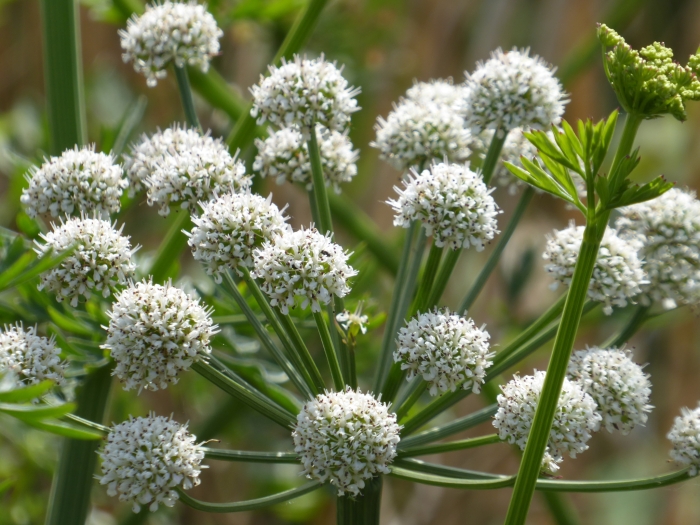Hemlock Water-Dropwort
(Oenanthe crocata)
Hemlock Water-Dropwort (Oenanthe crocata)
/
/

jamie-aa
CC BY 4.0
Image By:
jamie-aa
Recorded By:
Copyright:
CC BY 4.0
Copyright Notice:
Photo by: jamie-aa | License Type: CC BY 4.0 | License URL: http://creativecommons.org/licenses/by/4.0/ | Rights Holder: jamie-aa | Publisher: iNaturalist | Date Created: 2023-05-31T16:45:43-07:00 |




















Estimated Native Range
Summary
Oenanthe crocata, commonly known as hemlock water-dropwort or dead man’s fingers, is a perennial herb native to riparian zones, damp meadows, and wet woodlands across Europe, North Africa, and western Asia. It often thrives along riverbanks and ditches where the soil remains moist. This species can reach up to 59 inches in height and is characterized by its hollow, cylindrical stems and pinnate leaves with serrated leaflets. The plant produces small white flowers arranged in umbrella-like clusters, typically blooming from June to August. The roots bear pale yellow tubers that exude a yellowish fluid when cut, which are notorious for their high toxicity.
Hemlock water-dropwort is not commonly cultivated due to its extreme toxicity, as all parts of the plant contain potent poisons that can be lethal if ingested. However, its striking appearance, with lush green foliage and delicate flowers, can be deceptively attractive. In cultivation, it requires consistently moist soil and can tolerate partial shade to full sun. Due to its invasive potential, caution is advised when considering this plant for gardens, and it should never be planted near areas where children or pets have access.CC BY-SA 4.0
Hemlock water-dropwort is not commonly cultivated due to its extreme toxicity, as all parts of the plant contain potent poisons that can be lethal if ingested. However, its striking appearance, with lush green foliage and delicate flowers, can be deceptively attractive. In cultivation, it requires consistently moist soil and can tolerate partial shade to full sun. Due to its invasive potential, caution is advised when considering this plant for gardens, and it should never be planted near areas where children or pets have access.CC BY-SA 4.0
Plant Description
- Plant Type: Herb
- Height: 3-5 feet
- Width: 2-3 feet
- Growth Rate: Moderate
- Flower Color: White
- Flowering Season: Summer
- Leaf Retention: Deciduous
Growth Requirements
- Sun: Full Sun, Part Shade
- Water: High
- Drainage: Medium, Slow
Common Uses
Water Garden
Natural Habitat
Native to riparian zones, damp meadows, and wet woodlands across Europe, North Africa, and western Asia
Other Names
Common Names: Water-Dropwort, Deadly Carrot, Water-Hemlock
Scientific Names: , Oenanthe crocata, Oenanthe apiifolia, Oenanthe crocata f. macrosciadia, Oenanthe crocata subsp. apiifolia, Oenanthe crocata var. apiifolia, Oenanthe crocata var. apiifolia, Oenanthe crocata var. broteri, Oenanthe crocata var. crocata, Oenanthe crocata var. longissima
GBIF Accepted Name: